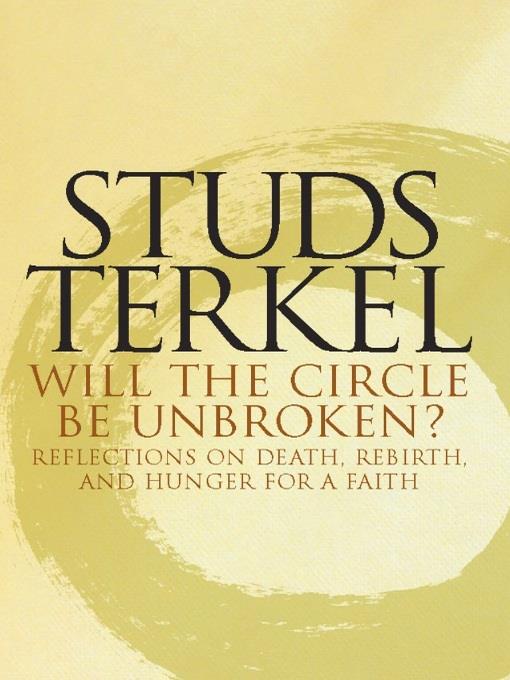
Will the Circle Be Unbroken?
Reflections on Death, Rebirth, and Hunger for a Faith
کتاب های مرتبط
- اطلاعات
- نقد و بررسی
- دیدگاه کاربران
نقد و بررسی

Starred review from August 20, 2001
In the past, Terkel (The Good War) has gotten people to talk about their concrete experiences, like family, war and the Depression, rather than an event that no one can talk about after having experienced it. Now Terkel, a gifted interviewer, encourages the subjects of this book to talk openly about their feelings regarding life's final frontier. The raconteurs who share their moving stories in this collection range from emergency room doctors and paramedics to public figures such as Kurt Vonnegut, NPR commentator Ira Glass and country music guitarist Doc Watson. Each of Terkel's subjects brings his or her unique insights to the mystery of death. For example, emergency room doctor Ed Reardon says we fear death because we don't understand it, and that it's hope that keeps us going while we're alive. Country woman Peggy Terry observes that death would not be so frightening if "we've fulfilled ourselves as human beings, not as collectors
of stuff, money, and bank accounts." Tico Valle, a young Latino gay male, reflects on the death of his partner and the significance of reincarnation for understanding the meaning of life. Finally, Emmett Till's mother, Mamie Mobley, poignantly recalls her son's sacrifice: "Emmett had died that men might have freedom here on Earth. That we might have a right to life.... If Jesus Christ died for our sins, Emmett Till bore our prejudices." Terkel's refusal to overwhelm readers with his own philosophical reflections and his willingness to allow ordinary men and women to speak for themselves make this a stirring and enlightening collection that will lead readers to think more deeply about their own hopes and fears. (Oct.)Forecast:This is bound to be another bestseller for Terkel, who will tour five cities to promote it. First serial was sold to the
Atlantic Monthly.

September 1, 2001
Terkel, the Pulitzer Prize-winning author of a dozen books on American life (most recently The Spectator), writes in the introduction about his own encounters with death narrowly avoided first as an asthmatic child seeking help in falling asleep and then as an adult undergoing quintuple bypass surgery. He also describes the deaths of his father and, more recently, his 87-year-old wife. Like his previous books, this current volume collects interviews with a variety of people on a particular theme. Here he speaks with "sixty heroes . . . offering me their bone-deep, honest testimonies [which] have been a palliative beyond prescription." Terkel rightly claims that the book deals with "death, of course, but understood only by living to the full its long prelude, life." His heroes include medical personnel, strangers, parents, clergy, journalists, performers, and others, some well known, such as NPR's Ira Glass, author Kurt Vonnegut, and country singer Doc Watson, and some less familiar. Together they offer a wide spectrum of reflections on death and life. Highly recommended for public and seminary libraries. [See p. 210 for an interview with Terkel. Ed.] Carolyn M. Craft, Longwood Coll., Farmville, VA
Copyright 2001 Library Journal, LLC Used with permission.

Starred review from August 1, 2001
Thirty years ago, when Gore Vidal suggested he write about death, Terkel demurred: "It was too big for me; too abstract . . . more in the domain of the metaphysician or the minister." But in a new century, having lived through a quintuple bypass and the 1999 death of his beloved wife, Ida, Terkel takes on this subject in his usual inclusive manner. There are a handful of famous names here--entertainers (Doc Watson, William Warfield, Uta Hagen), writers (Kurt Vonnegut, Vine Deloria), and activists (Rev. Willie T. Barrow, Father Len Dubi, Rabbi Robert Marx)--and names Terkel fans will recognize from previous works, such as Peggy Terry, Hank Oettinger, and Kid Pharaoh. A few individuals have unique relationships with death, for example, a Hiroshima survivor and a former death-row inmate. But most of Terkel's conversations are with "folks": doctors and nurses, firemen and police officers, teachers and church workers, and fathers, mothers, sons, and daughters. " Circle" is a different book than it would have been 30 years ago because of AIDS, which casts its shadow over a number of stories. Many of Terkel's subjects describe themselves as "spiritual, not religious"; a number believe they've had contact with deceased friends or relatives; and "invariably, those who have a faith . . . have an easier time with loss." An involving celebration of life and exploration of death.(Reprinted with permission of Booklist, copyright 2001, American Library Association.)

























دیدگاه کاربران